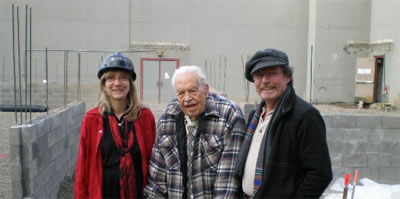 |
 |
 |
|
News & Notices
Fellows Named
In Memoriam:
News From:
Commissions
Conference & Stage Expo
For the Record
 |
Horace Robinson, center, reviews part of the construction project which will add a new theatre to the facility named after Mr. Robinson at the University of Oregon. With Mr. Robinson are Sandy Bonds, right, and her husband, Joseph Gilg, right. Photo/Courtesy Sandy Bonds
|
|
|
Horace Robinson Receives
USITT Special Citation Ms. Bonds made these remarks in presenting the USITT Special Citation to Horace Robinson as part of the Conference Keynote and Kickoff Event at the 2008 Annual Conference. Mr. Robinson was unable to attend. I have the incomparable honor of presenting a Special Citation to one of my heroes, Horace Robinson, professor emeritus at the University of Oregon, where he taught for 42 years. When Horace retired in 1975, the theatre, which he had designed and built in 1949, was named for him, an unprecedented yet enlightened decision from the campus administration. As a fresh, young faculty member arriving on the campus in 1979, I was vaguely yet respectfully aware of the magnitude of Horace's local contributions. As the years passed, I have learned more about his national and international influence, and will briefly recount his remarkable story by quoting from USITT Fellows who personally witnessed the noteworthy milestones of his career. As Joel Rubin recalled, "Following World War II and well into the 1960s, cafetoriums and gymnatoriums were being promoted for saving on construction costs and providing greater utilization of building spaces. Horace led the fight against the building of these useless spaces, both within the Architecture Project of what was then the American Educational Theatre Association, and later in discussions at the early USITT Conferences. "He was among the first to rail against and rally the troops in this cause. As a result of his untiring efforts, he undoubtedly saved scores of schools from those terrible impractical monstrosities." Dick Arnold depicts Horace as "a true pioneer in advancing theatre education, of the caliber of Lucy Barton and Samuel Selden. In addition, Horace's leadership as President of AETA, and of NAST, a board member for ANTA, and his American College Theatre Award of Excellence reveal the extent of his accomplishments in theatre. Horace was among only a handful of giants who worked to solve the problems of theatre training and to improve the profession at a time when theatre education was in acute need for revolutionary change." Horace's influence spread overseas as well with two Fulbright Awards, a lectureship in Australia, and a research project on theatre in Finland. He shepherded five student troupes on USO tours. The legendary cast of Little Mary Sunshine still contacts Horace regularly and has staged annual reunions for 45 years. Horace received an Award of Appreciation from the USO for his "generous and important contribution towards the morale of our American men and women serving at overseas bases around the world." When I informed Horace of this Special Citation, he told me he always carried his USITT card on these trips, as it frequently provided him entree with colleagues and friends in many of his destinations. Horace, your Special Citation reads: "In recognition for your pioneering and enduring contribution to the establishment of educational theatre in America and your prodigious efforts advocating for design excellence in the theatre architecture for these programs USITT gratefully acknowledges and honors your extraordinary lifetime of leadership and inspiration for generations of theatre students and faculty." |
||
United States Institute for Theatre Technology, Inc.:
© 2008 Volume XLVIII, Number 5